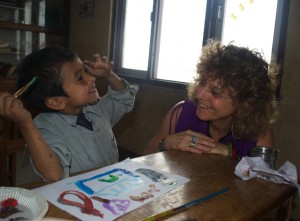Build Reading Skills. Studies have shown that the most enthusiastic and voracious readers received early introduction to reading at home. Encourage your child to make reading a part of every day life by adding a few simple steps to your daily routine. If you are modeling reading at home, it’s likely your child will follow your footsteps and learn to love to read. Of course, they don’t need to read the Wall Street Journal, but by offering a wide variety of reading material around the house, your child will be encouraged to pick up a book and start making reading a habit.
Continue reading
5 Ideas to Help Kids Learning to Follow Directions
At Home Ideas Parents' Corner
Help Your Kids Follow Directions. Image courtesy of http://www.keepcalm-o-matic.co.uk/p/keep-calm-and-follow-directions-8/
Please put your toys away. Please put your toys away. Please put your toys away now! Sound like a broken record? Sometimes it does around my house. It can be very frustrating and hard to keep calm when your child does not follow instructions or completely ignores your requests. Often kids view these instructions as commands or even punishments, when they are simply ways to make their lives (and ours) easier. Following directions is a crucial life skill, and if it’s not cultivated properly at home can be a problem once school arrives. What are some ways you can help your child follow your directions? We’ve got a few ideas.
Art Therapy and Speech Therapy
Speech Therapy Techniques
Art Therapy as Speech Therapy. Image source: arttherapywithoutborders.wordpress.com
Sometimes with younger kids, speech therapy doesn’t need to look like a traditional speech therapy classroom regimen. Instead, speech therapy can take on a more creative approach using Art. Yes — Art can be a useful tool to enhance a child’s speech and language development. Whether or not you have a child who needs help with verbal expression or auditory comprehension, there are excellent art-based activities that your child can do to engage all of his senses. And the best part — art therapy can be done at home! I know for some, even the phrase “art project” evokes a fear of mess and chaos! But, for a child in speech therapy, an art experience may be just what he needs to explore his creative side and improve his verbal and comprehension skills at the same time.
Continue reading
Family Road Trip! 6 Activities for Drama-Free Driving.
Games and Activities
Summer Road Trip Ideas. Image source: fairfoodfight.com
Road Trip! We’re all doing a road trip of some sort this summer! For some, it may be an hour upstate to visit grandparents, and for others, a trip across the country. For many parents, the thought of hours and hours in the car with pre-school kids creates anxiety. Are you envisioning whining, complaining and tantrums? Well, we have some good news! With a little planning ahead, these activities can make your family road trips pain-free, meltdown free, a tad bit educational and a whole lot of fun!
Continue reading
4 Tips for Managing Difficult Behaviors in Children
Speech Therapist Speech Therapy TechniquesAs SLPs, we have all dealt with our share of difficult behavior. I’ve certainly found myself at a loss for how to approach a client that has trouble with focus, motivation, or simply keeping “in line.” After all, we work with children, so this should be expected to a certain degree. However, challenging behaviors can get in the way of our work, and we must do everything we can to avoid them. When they do occur, we must be prepared with reliable strategies to minimize their negative impact on the session at hand, and ultimately, on our entire therapeutic interaction with that client. The four strategies described below will provide you with a plan for managing difficult child behaviors as they arise, and getting you back on track with your therapy.
Continue reading






